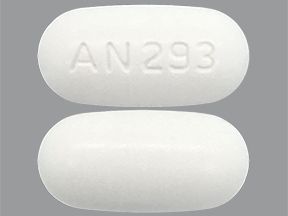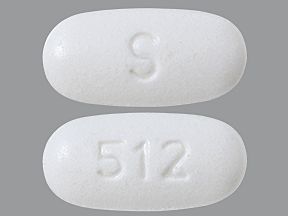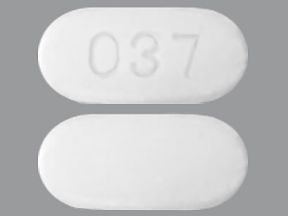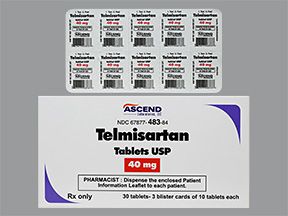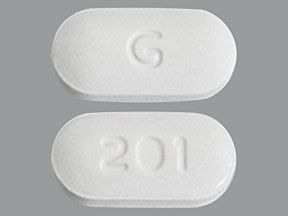- Telmisartan oral tablet is available as both a generic and brand-name drug. Brand name: Micardis.
- Telmisartan only comes as a tablet you take by mouth.
- Telmisartan oral tablet is used to treat high blood pressure. It may also be used to lower your risk for heart attack, stroke, or death from heart disease if you’re 55 years or older and at high risk of major heart disease events and can’t take angiotensin-converting enzyme (ACE) inhibitors.
Other warnings
- Low blood pressure: Telmisartan can cause your blood pressure to drop too low. This may make you feel dizzy or lightheaded or cause a headache. Your risk may be higher if you’re dehydrated or taking high doses of water pills (diuretics).
- High potassium levels: Telmisartan can increase your potassium levels. Your risk may be higher if you have kidney problems or heart failure. Your doctor should check your potassium levels while you’re taking this drug.
Telmisartan oral tablet is a prescription drug that’s available as the brand-name drug Micardis. It’s also available as a generic drug. Generic drugs usually cost less than the brand-name version. In some cases, they may not be available in all strengths or forms as the brand-name drug.
Why it’s used
Telmisartan is used to lower high blood pressure. Telmisartan may also be used to lower your risk for heart attack, stroke, or death from heart disease. It’s given to adults who are 55 years or older and at high risk of major heart disease events who can’t take angiotensin-converting enzyme (ACE) inhibitors.
To treat high blood pressure, telmisartan may be taken in combination with other blood pressure-lowering drugs.
How it works
Telmisartan belongs to a class of drugs called angiotensin receptor blockers (ARBs). A class of drugs is a group of medications that work in a similar way. They’re often used to treat similar conditions.
Telmisartan works by blocking the effect of angiotensin. This makes your blood vessels relax more. It also allows your kidney to get rid of excess water and salt. This helps lower your blood pressure.
Telmisartan oral tablet doesn’t cause drowsiness. However, it may cause other side effects.
More common side effects
The more common side effects that occur with telmisartan include:
- sinus pain and congestion
- back pain
- diarrhea
- sore throat
- flu-like symptoms, such as fever and body aches
- upset stomach
- muscle pain
- headache
- dizziness
- fatigue
- nausea
If these effects are mild, they may go away within a few days or a couple of weeks. If they’re more severe or don’t go away, talk with your doctor or pharmacist.
Serious side effects
Call your doctor right away if you have any of these serious side effects. Call 911 if your symptoms feel life threatening or if you think you’re having a medical emergency.
- Low blood pressure. Symptoms include:
- faintness
- dizziness
- Kidney disease. If you already have kidney disease, this drug may make it worse. Symptoms include:
- swelling in your feet, ankles, or hands
- unexplained weight gain
- Allergic reaction. Symptoms include:
- swelling of your face, tongue, or throat
- trouble breathing
- skin rash
Disclaimer: Our goal is to provide you with the most relevant and current information. However, because drugs affect each person differently, we cannot guarantee that this information includes all possible side effects. This information is not a substitute for medical advice. Always discuss possible side effects with a healthcare professional who knows your medical history.
Telmisartan oral tablet can interact with other medications, herbs, or vitamins you might be taking. An interaction is when a substance changes the way a drug works. This can be harmful or cause the drugs that you take to not work as well. To help prevent interactions, your doctor should manage all of your medications carefully. To find out how this drug might interact with something else you’re taking, talk with your doctor or pharmacist.
Examples of drugs that can cause interactions with telmisartan are listed below.
Blood pressure medications
Telmisartan affects the renin-angiotensin-aldosterone system in your body. You should not take this drug with other medications that affect this system. These drugs include:
- aliskiren. Telmisartan and aliskiren should not be used together in adults with diabetes or moderate kidney disease.
- angiotensin receptor blockers (ARBs), such as:
- candesartan
- eprosartan
- irbesartan
- losartan
- olmesartan
- valsartan
- azilsartan
- angiotensin-converting enzyme (ACE) inhibitors, such as:
- benazepril
- captopril
- enalapril
- fosinopril
- lisinopril
- moexipril
- perindopril
- quinapril
- ramipril
- trandolapril
Pain medications
Taking nonsteroidal anti-inflammatory drugs (NSAIDs) with telmisartan can increase your risk of kidney problems. Your risk may be higher if you’re a senior, are dehydrated, take water pills (diuretics), or have kidney problems. These drugs include:
- ibuprofen
- naproxen
Digoxin
The levels of digoxin in your blood may increase when taken with telmisartan. Your doctor may monitor your blood levels when starting, adjusting, or stopping telmisartan.
Lithium
The levels of lithium in your blood may increase when taken with telmisartan. Your doctor may monitor your blood levels when starting, adjusting, or stopping telmisartan.
Disclaimer: Our goal is to provide you with the most relevant and current information. However, because drugs interact differently in each person, we cannot guarantee that this information includes all possible interactions. This information is not a substitute for medical advice. Always speak with your healthcare professional about possible interactions with all prescription drugs, vitamins, herbs and supplements, and over-the-counter drugs that you are taking.
Telmisartan oral tablet comes with several warnings.
Allergy warning
Telmisartan can cause a severe allergic reaction. Symptoms include:
- trouble breathing
- swelling of your face, throat, or tongue
- hives
Do not take this drug again if you’ve ever had an allergic reaction to it. Taking it again could be fatal (cause death).
Alcohol interaction
Using alcohol with this drug can increase your risk for low blood pressure. This may cause faintness or dizziness.
Warnings for people with certain health conditions
For people with severe heart failure: Telmisartan may reduce the amount of urine you produce or increase your risk for kidney injury.
For people with kidney problems: Telmisartan may reduce the amount of urine you produce or increase your risk for kidney injury.
Warnings for other groups
For pregnant women: Studies show a risk of serious negative effects to the fetus when a mother takes this drug, especially during the second and third trimesters. Telmisartan may harm or end your pregnancy. However, in certain cases, the benefits of taking the drug during pregnancy may outweigh the potential risks.
Tell your doctor if you’re pregnant or plan to become pregnant. Telmisartan should be used during pregnancy only if the potential benefit justifies the potential risk.
If you become pregnant while taking telmisartan, stop taking it and call your doctor right away.
For women who are breastfeeding: It isn’t known if telmisartan passes into breast milk. If it does, it may cause serious effects in a breastfeeding child. You and your doctor may need to decide if you’ll take this drug or breastfeed.
For seniors: Older adults may process drugs more slowly. A normal adult dose may cause levels of this drug to be higher than normal in your body. If you’re a senior, you may need a lower dose or a different schedule.
For children: This medication hasn’t been studied in children and should not be used in children under the age of 18 years.
This dosage information is for telmisartan oral tablets. All possible dosages and forms may not be included here. Your doctor will tell you what dosage is right for you. Your dose, form, and how often you take it will depend on:
- your age
- the condition being treated
- how severe your condition is
- other medical conditions you have
- how you react to the first dose
Forms and strengths
Generic: Telmisartan
- Form: Oral tablet
- Strengths: 20 mg, 40 mg, 80 mg
Brand: Micardis
- Form: Oral tablet
- Strengths: 20 mg, 40 mg, 80 mg
Dosage for high blood pressure
Adult dosage (ages 18 years and older)
- The typical starting dose is 40 mg, taken by mouth, once per day.
- The maintenance dose is 20–80 mg, taken by mouth, once per day.
Child dosage (ages 0–17 years)
This medication hasn’t been studied in children and should not be used in children under the age of 18 years.
Senior dosage (ages 65 years and older)
There are no specific recommendations for senior dosing. Older adults may process drugs more slowly. A normal adult dose may cause levels of this drug to be higher than normal in your body. If you’re a senior, you may need a lower dose or a different schedule.
Dosage to reduce the risk of a heart attack, stroke, or death from heart disease
Adult dosage (ages 55 years and older)
- For people 55 years and older who cannot take angiotensin-converting enzyme (ACE) inhibitors, the typical dose is 80 mg, taken by mouth, once daily.
Adult dosage (ages 18–55 years)
Telmisartan is not used in this age group for this indication.
Child dosage (ages 0–17 years)
This medication hasn’t been studied in children and should not be used in children under the age of 18 years.
Senior dosage (ages 65 years and older)
There are no specific recommendations for senior dosing. Older adults may process drugs more slowly. A normal adult dose may cause levels of this drug to be higher than normal in your body. If you’re a senior, you may need a lower dose or a different schedule.
Special dosage considerations
Your doctor may start you on a lower dose and increase your dose more slowly if needed if you have liver problems.
Disclaimer: Our goal is to provide you with the most relevant and current information. However, because drugs affect each person differently, we cannot guarantee that this list includes all possible dosages. This information is not a substitute for medical advice. Always speak with your doctor or pharmacist about dosages that are right for you.
Telmisartan oral tablet is used for long-term treatment. It comes with serious risks if you don’t take it as prescribed.
If you take too much: Taking too much telmisartan may make you feel dizzy or like your heart is beating too fast or too slow. If you think that you’ve taken too much, call your doctor or go to the emergency room right away.
If you do not take it at all:
To treat high blood pressure: Your blood pressure may get worse. This will increase your risk of a heart attack or stroke.
To reduce the risk of a heart attack, stroke, or death: Telmisartan reduces your chance of having a heart attack or stroke. If you do not take it, your risk may increase.
If you stop taking it suddenly:
To treat high blood pressure: Do not stop taking telmisartan without talking to your doctor first. Stopping this drug suddenly can cause your blood pressure to spike. This can increase your risk for heart attack or stroke.
To reduce the risk of a heart attack, stroke, or death: Do not stop taking telmisartan without talking to your doctor.
If you don’t take it on schedule: To treat high blood pressure: Your blood pressure may get worse. You may not feel any different, but your blood pressure may not be well controlled. This can increase your risk for a heart attack or stroke.
To reduce the risk of a heart attack, stroke, or death: If you don’t take this drug each day, your risk for a heart attack or stroke may increase.
What to do if you miss a dose: If you forget to take your dose, take it as soon as you remember. If it’s just a few hours before the time for your next dose, then wait and only take one dose at that time. Never try to catch up by taking two doses at once. This could cause toxic side effects.
How to tell if the drug is working: You may not feel any different when taking this medication. You may be able to tell this drug is working if you check your blood pressure and it’s lower. Your doctor will let you know if this drug is working for you.
Keep these considerations in mind if your doctor prescribes telmisartan oral tablet for you.
General
- Telmisartan can be taken with or without food.
- You can crush or cut the tablet.
Storage
- Store telmisartan at room temperature from 56–89°F (15–30°C).
- Telmisartan should not be removed from its packaging (blister pack) until right before you take your dose.
- Keep it away from light and high temperature.
- Don’t store this medication in moist or damp areas, such as bathrooms.
Refills
A prescription for this medication is refillable. You should not need a new prescription for this medication to be refilled. Your doctor will write the number of refills authorized on your prescription.
Travel
When traveling with your medication:
- Always carry your medication with you. When flying, never put it into a checked bag. Keep it in your carry-on bag.
- Don’t worry about airport X-ray machines. They won’t damage your medication.
- You may need to show airport staff the pharmacy label for your medication. Always carry the original prescription-labeled container with you.
- Don’t put this medication in your car’s glove compartment or leave it in the car. Be sure to avoid doing this when the weather is very hot or very cold.
Self-management
You may need to check your blood pressure at home. To do this, you may need to buy your own blood pressure monitor.
You should keep a log with the date, time of day, and blood pressure readings. Bring this diary with you to your doctor appointments.
Clinical monitoring
During treatment with this drug, your doctor will check your:
- blood pressure
- kidney function
- electrolyte levels
Hidden costs
You may have to buy your own blood pressure monitor, so that you can check your blood pressure at home. These monitors are available at most pharmacies.
There are other drugs available to treat your condition. Some may be better suited for you than others. Talk with your doctor about other options that may work for you.
Disclaimer: Medical News Today has made every effort to make certain that all information is factually correct, comprehensive, and up to date. However, this article should not be used as a substitute for the knowledge and expertise of a licensed healthcare professional. You should always consult your doctor or another healthcare professional before taking any medication. The drug information contained herein is subject to change and is not intended to cover all possible uses, directions, precautions, warnings, drug interactions, allergic reactions, or adverse effects. The absence of warnings or other information for a given drug does not indicate that the drug or drug combination is safe, effective, or appropriate for all patients or all specific uses.









